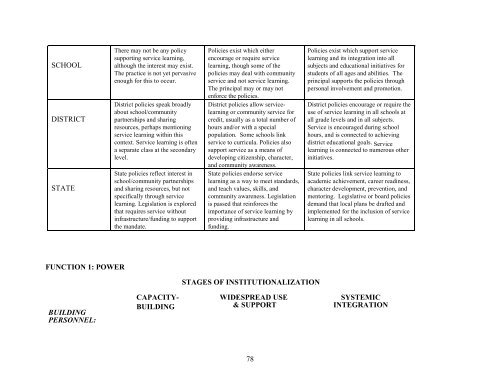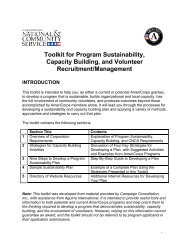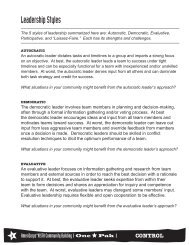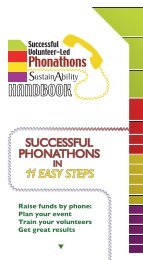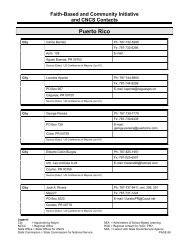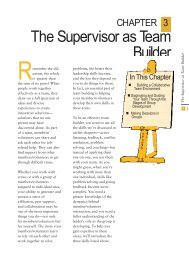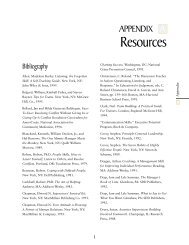MAKE IT LAST FOREVER: THE ... - National Service Resource Center
MAKE IT LAST FOREVER: THE ... - National Service Resource Center
MAKE IT LAST FOREVER: THE ... - National Service Resource Center
You also want an ePaper? Increase the reach of your titles
YUMPU automatically turns print PDFs into web optimized ePapers that Google loves.
SCHOOL<br />
DISTRICT<br />
STATE<br />
FUNCTION 1: POWER<br />
BUILDING<br />
PERSONNEL:<br />
There may not be any policy<br />
supporting service learning,<br />
although the interest may exist.<br />
The practice is not yet pervasive<br />
enough for this to occur.<br />
District policies speak broadly<br />
about school/community<br />
partnerships and sharing<br />
resources, perhaps mentioning<br />
service learning within this<br />
context. <strong>Service</strong> learning is often<br />
a separate class at the secondary<br />
level.<br />
State policies reflect interest in<br />
school/community partnerships<br />
and sharing resources, but not<br />
specifically through service<br />
learning. Legislation is explored<br />
that requires service without<br />
infrastructure/funding to support<br />
the mandate.<br />
CAPAC<strong>IT</strong>Y-<br />
BUILDING<br />
Policies exist which either<br />
encourage or require service<br />
learning, though some of the<br />
policies may deal with community<br />
service and not service learning.<br />
The principal may or may not<br />
enforce the policies.<br />
District policies allow servicelearning<br />
or community service for<br />
credit, usually as a total number of<br />
hours and/or with a special<br />
population. Some schools link<br />
service to curricula. Policies also<br />
support service as a means of<br />
developing citizenship, character,<br />
and community awareness.<br />
State policies endorse service<br />
learning as a way to meet standards,<br />
and teach values, skills, and<br />
community awareness. Legislation<br />
is passed that reinforces the<br />
importance of service learning by<br />
providing infrastructure and<br />
funding.<br />
STAGES OF INST<strong>IT</strong>UTIONALIZATION<br />
WIDESPREAD USE<br />
& SUPPORT<br />
78<br />
Policies exist which support service<br />
learning and its integration into all<br />
subjects and educational initiatives for<br />
students of all ages and abilities. The<br />
principal supports the policies through<br />
personal involvement and promotion.<br />
District policies encourage or require the<br />
use of service learning in all schools at<br />
all grade levels and in all subjects.<br />
<strong>Service</strong> is encouraged during school<br />
hours, and is connected to achieving<br />
district educational goals. <strong>Service</strong><br />
learning is connected to numerous other<br />
initiatives.<br />
State policies link service learning to<br />
academic achievement, career readiness,<br />
character development, prevention, and<br />
mentoring. Legislative or board policies<br />
demand that local plans be drafted and<br />
implemented for the inclusion of service<br />
learning in all schools.<br />
SYSTEMIC<br />
INTEGRATION


